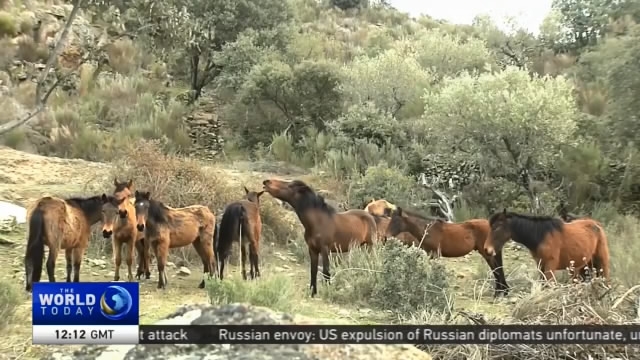
20:35, 27-Mar-2018
Rewilding Portugal: Group reintroduces wild horses in Portugal

The descendants of the original wild horses on the Iberian Peninsula are being gathered and protected in Portugal. It's part of project by Rewilding Europe, a nonprofit group that seeks to turn the loss of rural farming life into an opportunity to boost biodiversity. Their partners in Portugal are focusing on two of the oldest horse breeds in Europe, now making a comeback against their domesticated cousins. Al Goodman reports from a remote nature preserve in eastern Portugal.
In danger of extinction. These Sorraia horses, descendants of an ancient breed on the Iberian Peninsula. Experts say only about 600 remain. A few dozen are right here, being nurtured in eastern Portugal, by biologist Pedro Prata and his local partners of the Rewilding Europe project, which aims to ensure survival for various species on a continent that's gone so urban, and with so many domesticated farm animals.
PEDRO PRATA ATN EXECUTIVE COORDINATOR "It's not easy. It's not a strategy that immediately takes effect, in order to promote this rewilding strategy in larger landscapes, especially in Europe where everything is regulated, and the spaces that are actually left for nature to come back, it's not much available."
But they're making room here and having some success.
Al: "There are more of these now than recently or it's about the same?"
Pedro: "No, we have more, we have been building up the herd. The Sorraia has for me all the little details that reminds of horse of the primitive type. You see that he has the stripes and the double color mane and the shape of the body that fits into the ecosystem. That resembles not a domestic animal that is dependent on management by man but actually from a wild animal."
AL GOODMAN FAIA BRAVA NATURE PRESERVE, PORTUGAL "The Sorraia horse is the most recent project for this Rewilding site in Portugal because of their sharply reduced numbers. But for more than a decade, they've been working with another horse, called the Garrano, which numbers in the thousands."
And looks like more are on the way. It's mating season and we're in a different part of the nature preserve. It's called Faia Brava or Wild Cliff. A river runs through it in winter, but dries up in summer. The Garrano horses are up in the hills and some still show, on their spotty skin, the effects of last summer's drought.
Prata: "They can survive anything. So they are very resilient and that's also a trait that's important for promoting these wild grazers in the large landscape. You need animals that can actually manage by themselves."
And the Rewilding project in the vast nature preserve is also helping the villages, where some smart rural hotels have sprung up to handle a small but steady stream of European visitors for nature tourism.
But on one expects overnight miracles in trying to making Europe wild again.
PEDRO PRATA ATN EXECUTIVE COORDINATOR "In my lifetime? I hope so, of course, but I'm pretty aware that it's going to be a long run."
Al Goodman, CGTN, Faia Brava nature preserve, in eastern Portugal.

SITEMAP
Copyright © 2018 CGTN. Beijing ICP prepared NO.16065310-3
Copyright © 2018 CGTN. Beijing ICP prepared NO.16065310-3